WHAT HAPPENS IN MY MOUTH?
Why Is My Tongue Important?, What Does Smell Have To Do With It?
Your mouth is your first digestive organ. You eat because you are hungry and because you enjoy the taste of food. Most people are attracted to certain foods by the smell. Everyone enjoys some foods. Everyone also has foods they do not like.
Why Is My Tongue Important?
Your tongue detects the taste of food. Your tongue's main job is to protect you from poisonous or rotten food. You would spit out a food if it tasted really bad!
 Your tongue tastes sweet ice cream. It can also tell you that the ice cream is cold.
Your tongue tastes sweet ice cream. It can also tell you that the ice cream is cold.
Taste buds cover your tongue. Taste buds detect tastes. There are four main tastes:
- bitter
- sweet
- salty
- sour
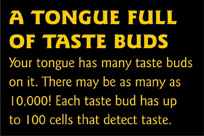 A TONGUE FULL OF TASTE BUDS. Your tongue has many taste buds on it. There may be as many as 10,000! Each taste bud has up to 100 cells that detect taste.
A TONGUE FULL OF TASTE BUDS. Your tongue has many taste buds on it. There may be as many as 10,000! Each taste bud has up to 100 cells that detect taste.
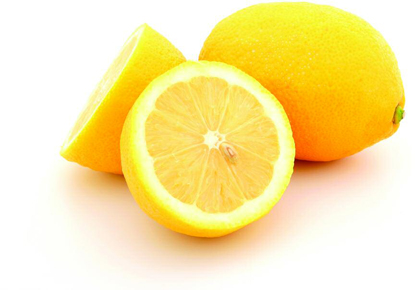 If you licked a lemon, it would taste very sour.
If you licked a lemon, it would taste very sour.
What Does Smell Have To Do With It?
Most foods don't have just four tastes. To taste a full range of flavors, you need a sense of smell. So your nose and mouth are connected. Without your sense of smell, you would not be able to taste your food very well. You can try this for yourself. Hold your nose the next time you eat some food. Can you still taste it?
Why Do I Have to Chew Food?
Food must be broken down. Chewing food with your teeth breaks the food down. Large pieces of food break down into smaller pieces of food. Your tongue plays an important part in chewing. You move food with your tongue. Then you bite down on the food with your teeth.
Teeth
Babies have twenty teeth. Adults have thirty-two teeth. Your front teeth are called your incisors. The next teeth are called the canines. You use these two types of teeth to bite and tear food. The teeth at the back and sides of your mouth are called premolars and molars. Most chewing is done on these large teeth.
 Baby teeth fall out to make way for adult teeth. Can you remember when your baby teeth fell out?
Baby teeth fall out to make way for adult teeth. Can you remember when your baby teeth fell out?
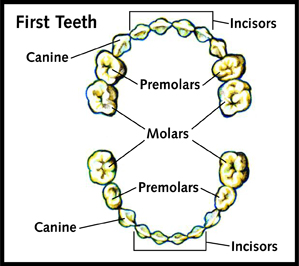 Next time you eat a meal, check which teeth you use to bite. Check which you use to tear and chew.
Next time you eat a meal, check which teeth you use to bite. Check which you use to tear and chew.
Tooth Decay
If you do not regularly brush your teeth, food collects on them. Bacteria feed on the food. They make acids. The acids eat away at your teeth. This can cause teeth to decay. You can prevent tooth decay by brushing your teeth regularly.
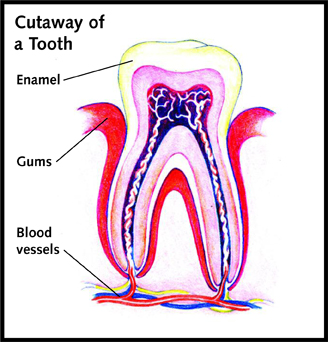 Teeth are covered with a hard substance called enamel.
Teeth are covered with a hard substance called enamel.
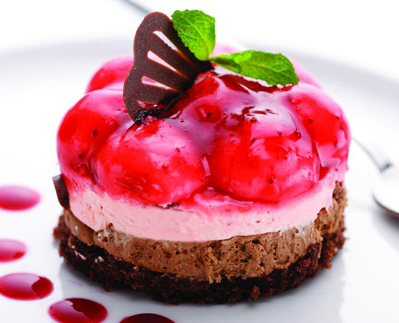 Does this photograph make your mouth water? Saliva forms in your mouth when you are ready to eat.
Does this photograph make your mouth water? Saliva forms in your mouth when you are ready to eat.
Why Does My Mouth Water?
Think about your favorite food. Does it make your mouth water? When your mouth waters, you are making saliva. Saliva is a watery liquid. You make it in your mouth all day long. You need saliva for three main reasons:
1. To make food wet. It is hard to swallow food dry. Imagine eating a cracker or a sandwich without saliva to make it moist. It would be very hard to do. Also, your tongue can not taste food when it is dry. Saliva helps you taste.
2. To help keep your mouth clean. Saliva rinses the inside of your mouth. It contains chemicals that help prevent infection.
3. To begin the process of digestion. Saliva contains enzymes. An enzyme in saliva digests starch. Starch is found in food like bread and pasta.
 ALL DAY, EVERY DAY. Your mouth makes saliva twenty-four hours a day. You make about two pints (one liter) of it every day!
ALL DAY, EVERY DAY. Your mouth makes saliva twenty-four hours a day. You make about two pints (one liter) of it every day!
What Is Saliva?
Saliva is 98 percent water. It also contains mucus, enzymes, and other chemicals. Saliva is made by glands. The glands are found in the bottom and sides of the mouth.
 It would be hard to swallow food without saliva. Babies produce plenty of saliva too!
It would be hard to swallow food without saliva. Babies produce plenty of saliva too!
How Do I Swallow?
You chew your food. As you do, you mix it with saliva. Your tongue pushes the wet ball of food to the back of your mouth. It enters the esophagus. The esophagus is a hollow tube of muscle. It squeezes the ball of food. This pushes the food downward.
Imagine you squeeze a tube of toothpaste. You squeeze at the end and push toward the opening. The toothpaste comes out the other end. The esophagus works in a similar way. In the esophagus, rings of muscle squeeze the food. They push it toward the stomach.
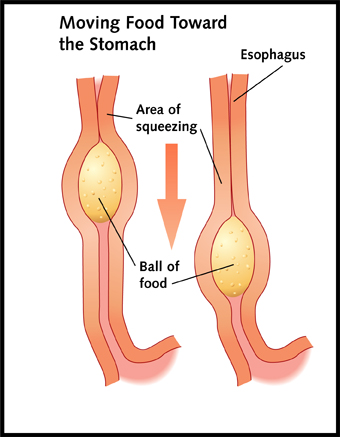 Muscles in the esophagus squeeze food downward.
Muscles in the esophagus squeeze food downward.
You can swallow even if you are upside down. That's because the esophagus is strong. It can push food toward the stomach no matter which end is up. The food slides down easily because it is wet. If the food is dry, it does not move down as easily.
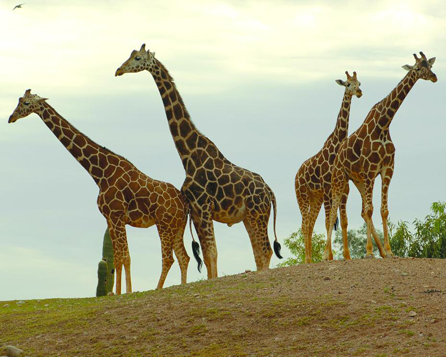 A LONG WAY DOWN. A human esophagus is about 10 inches (25 centimeters) long. A giraffe's is much longer. It runs up the giraffe's 6-foot (1.8-m) neck. With it, the giraffe can regurgitate food. This means it brings food back into its mouth. The food moves from the bottom of the esophagus to the top. Then the giraffe chews the food again. This helps with its digestion.
A LONG WAY DOWN. A human esophagus is about 10 inches (25 centimeters) long. A giraffe's is much longer. It runs up the giraffe's 6-foot (1.8-m) neck. With it, the giraffe can regurgitate food. This means it brings food back into its mouth. The food moves from the bottom of the esophagus to the top. Then the giraffe chews the food again. This helps with its digestion.
Additional topics
- WHY DO I HAVE A STOMACH? - How Big Is My Stomach?, What Does the Stomach Do?, Are There Enzymes in the Stomach?
- WHERE DOES FOOD GO WHEN YOU EAT? - What Is an Organ?, Which Organs Form My Digestive System?, The Long Journey
- Other Free Encyclopedias
Science Encyclopedia for KidsWhat Happens To Your Food When You Eat?